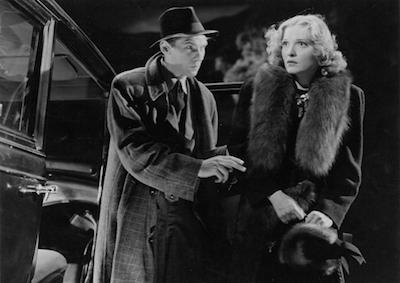Her Sister’s Secret is a melodrama of two sisters, one of whom has a child out of wedlock, the other unable to have children but willing to adopt, leading to a conflict that Bertolt Brecht would later rework in The Caucasian Chalk Circle. The film demonstrates an uncommon flair for the complicated nature of emotions, for the frivolity of love, the difficulties of motherhood and the barely concealed jealousy of the sister, while pitting itself against the unwritten Hollywood laws of a puritanical America, where a single mother has to be “punished.” Indeed, unlike standard Hollywood melodramas, here there are neither villains nor any moral condemnation, qualities that are common to German exile productions.
And this was indeed an exile production. Arnold Pressburger, himself a refugee in Hollywood, bought Austrian writer Gina Kaus’ novel, Die Schwestern Kleh (1932), and produced a French version in Paris as Conflit (1938). Pressburger then tried to remake the property in Hollywood, after producing Fritz Lang’s Hangmen Also Die! (1943). But he couldn’t get it past the Breen Office, which opined: “that it is basically a story of illicit sex and illegitimacy, without sufficient compensating moral values,” meaning the heroine doesn’t die for her sins. He therefore gave the property to a former film distributor from Berlin, and coincidentally, his brother-in-law, Henry Brasch, as a first Hollywood project. Financed at PRC, the producer brought in Edgar G. Ulmer who hired Franz Planer as cameraman, another Austro-Bohemian-Jewish émigré, like Pressburger, Kaus and Ulmer. Planer knew how to move a camera, German style, as the opening Mardi Gras scenes demonstrate, and Ulmer squeezes every penny of production value out of those scenes. The music was supplied by another German émigré, Hans Sommer, so all the principals behind the camera were from pre-Nazi Berlin. Meanwhile, fellow Berlin compatriots, Felix Bressart, Fritz Feld and Rudolf Anders are seen in crucial minor roles.
The film was restored from a surviving 35mm camera negative with the track re-recorded, an extreme rarity, since most PRC films only survive in 16mm. —Jan-Christopher Horak
Director: Edgar G. Ulmer. Production: PRC Pictures, Inc., Henry Brash Productions. Distribution: Producer’s Releasing Corp. Producers: Henry Brash, Raoul Pegal. Screenwriter: Anne Greene. Based on the novel Dark Angel by Gina Kaus. Cinematographer: Franz Planer. Art Direction: Edward C. Jewell. Editor: Jack Ogilvie. Music: Hans Sommer. Cast: Nancy Coleman, Margaret Lindsay, Phillip Reed, Felix Bressart, Regis Toomey. 35mm, b/w, 86 min.
Restored from the 35mm nitrate camera negative and the 35mm nitrate fine grain master. Laboratory services by The Cinemalab, Audio Mechanics, DJ Audio, Inc., Simon Daniel Sound. Special thanks to: Alexander Kogan Jr.






 Mobile Navigation
Mobile Navigation

